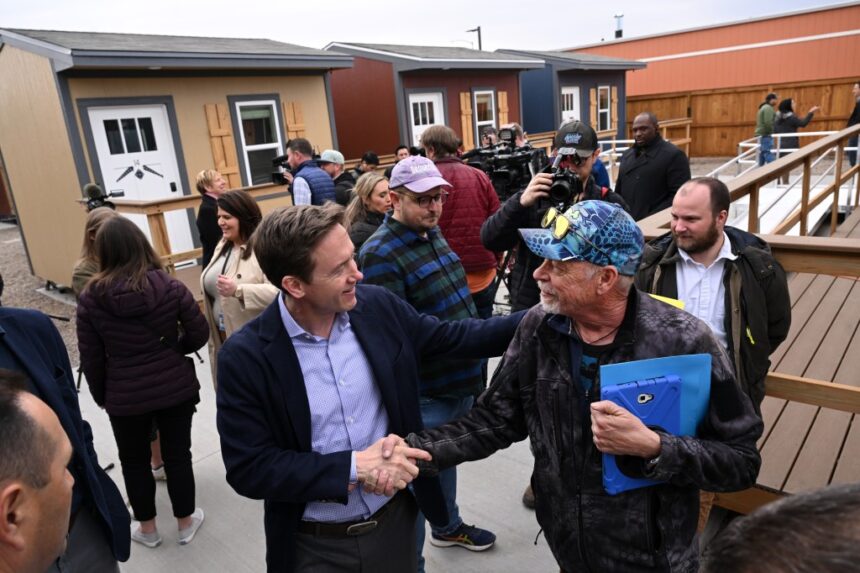Mike Johnston took the stage at Denver’s historic Paramount Theatre last week for his first State of the City address just days after he’d marked a full year as mayor.
He was in a reflective mood, recapping progress on homelessness and other problems in the time since he took office on July 17, 2023, after winning a 17-way mayoral race. He also previewed what’s next, including by pitching his recently announced sales tax increase to fund affordable housing initiatives — a proposal that’s facing questions from the City Council on its way to the November ballot.
Johnston, 49, sat down recently with The Denver Post to delve deeper into his first year and to discuss what lies ahead, including whether he still sees his goal of ending street homelessness in four years as realistic.
In the interview, he also talked about shortcomings in his otherwise galvanizing homeless initiative, called All In Mile High, which has moved more than 1,600 people into hotels and other temporary shelters, and how it relates to broader affordable housing goals. Some of that will hinge on whether the council and Denver voters go for his proposed 0.5% sales tax, which would raise an estimated $100 million a year.
Below are several excerpts, with his responses lightly edited for length and clarity. Context has been added where necessary.
Question: What do you think your biggest success has been in your first year in office?
I think it’s been our breakthrough success on homelessness.
Q: Where have you come up short in your first year, in your estimation?
I think there are some things that aren’t done yet that we still want to get done and are coming soon. I also think there are some safety protections in place at our All In Mile High sites that we should have been more stringent about when we first moved people in. The two lives we lost at the DoubleTree hotel are certainly two that I’ll never forget — and that is a decision I wish we had back.
Context: On March 16, Dustin Nunn, 38, and Sandra Cervantes, 43 — two people living in one of the city homeless initiative’s hotel shelters, a former DoubleTree at 4040 N. Quebec St. — were shot and killed. It was later revealed that the shelter’s operator, the Salvation Army, had not yet billed the city for any security measures at the building.
Q: Critics have pointed out that people who have been sheltered through the All In Mile High program are ending up back on the streets at a rate faster than they are moving on to more stable housing. What do you feel is preventing more people from transitioning out of shelters and micro-communities and into more permanent housing? How can you increase the throughput?
First of all, I agree with that criticism. I think they’re right and we are deeply focused on getting better at that.
The major focus for this year is increasing that throughput — having better systems of case management at each of these sites so that we know who every person is, we know what their needs are and we’re getting them the right service from the right provider at the right moment.
And we also know part of that need is to make sure there are more available units of affordable housing out there for them to move into. So we knew the first step was getting people off the streets and into transitional housing. The next step was always more permanent affordable housing — and that need exists not just for people coming out of homelessness, that need exists for teachers and nurses and servers and retail workers across the city.
And those units take a little longer to develop, longer to build and more resources. That’s why we’re so focused on affordability now, at scale — that’s going to be our biggest need. But a big part of this will be us getting better and better at case management with our providers at these sites.
Q: Do you still believe you can end unsheltered homelessness in Denver by the end of your first term?
I have to say I feel more optimistic about that possibility than I did a year ago. I’m so proud of what we built together as a city, and we put the infrastructure in place to show we can move thousands of people off the streets in a single year.
I think we’re on a path to end street homelessness for veterans this year, which is generally the first big benchmark along the way to getting there. And yes, we think we can make homelessness brief and rare and nonrecurring. That is really what the field defines as ending street homelessness, or what sometimes is called “functional zero.” It’s the idea that if 30 people enter homelessness in one month, 30 people exit in the same month.
I think we have a real path to get there in three years. In fact, we’re ahead of schedule of where I thought we would be on our efforts on veteran homelessness. That’s been an encouraging function of, when you build this infrastructure and you have the housing units there and you have the support services, you can close those encampments, move them to housing and keep encampments closed.
So we think we’ve shown this cycle works. We just have to do more of it better and faster. And that’s the path ahead.
Q: Your predecessor, Michael Hancock, called working with then-President Donald Trump’s administration one of the biggest challenges of his 12-year tenure. Are you preparing for the possibility of a second Trump term if he wins this fall?
I am not. I am preparing for the opportunity to avoid a second Trump term.
One thing I love about this job is that it’s nonpartisan. We’re just here to solve problems — and problems don’t have a partisan label. Either the solutions work, or they don’t. But if you have a president who makes it a priority to divide the country and to wage war on parts of the country, that makes it very hard to do business.
I just remember that, for instance, in the first term he wrote an executive order to ban federal grants to any city that had a sanctuary status. It would have been every single federal dollar, denied to a great majority of the country’s largest cities that don’t believe it makes sense to try to deport someone who has a busted taillight.
So I would hate for this city or this country to be stuck in a bunch of unproductive battles like that when we have far more important things we can do, like how to work together to solve the affordable housing problem or public safety challenges or homelessness.
Context: Soon after taking office in 2017, Trump issued an executive order that sought to deny federal grants to cities like Denver that did not cooperate fully with federal immigration authorities. The order faced legal challenges before it was ultimately revoked by President Joe Biden in 2021.

Q: What keeps you up at night?
That’s one of them (a second Trump term). The affordability of the city also keeps me up at night. Public safety keeps me up at night. I literally get a text from our police chief and the team every time we have a murder or violent crime or death in the city. And so that is the last thing I read at night or the first thing every morning. Every time that happens in a neighborhood, I feel that.
I think those are the biggest ones. The good news is, while that keeps me up at night, the days are filled with reminders of just the incredible resilience and passion and spirit of the people of the city.
Q: What is at stake if Denver’s housing costs continue to climb?
I think a lot about this one. I think it would be a dramatic change in what it feels like to live in Denver because of who can live in Denver.
I think it would mean almost all of the working-class families that support this city would no longer live in this city. So your teacher, your nurse, your barista, your local retail staff member — you wouldn’t find one of them who lives in the city anymore. And as their commutes become longer and the hours become slower, I think they might decide to just leave the metro area altogether.
And then the population stops growing and the city stops growing — and you have a city with no middle-class families left in it that feels like a shadow of its former self. We’ve seen, already, places like San Francisco where the population has just started dropping and the people that are left there are only the very wealthy.
That’s not where we want Denver to go. And that’s why the stakes feel so high.
Stay up-to-date with Colorado Politics by signing up for our weekly newsletter, The Spot.
Originally Published:











